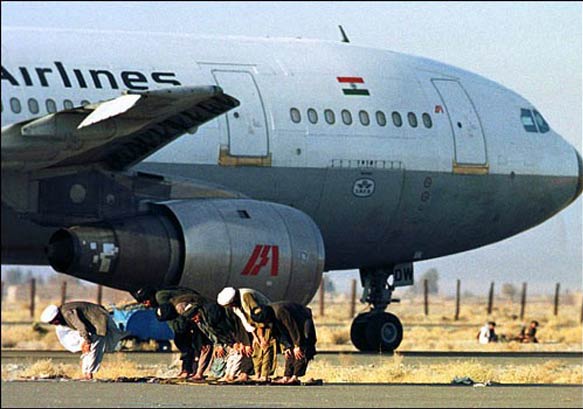New Delhi, March 23 : In its continuing expose through Wikileaks cables, the Hindu on Wednesday published a report saying that the United States refused to cooperate with India in the probe into the Indian Airlines IC-814 Kandahar hijacking case.
The report said, the Federal Bureau of Investigation (FBI) did not respond to Indian requests for assistance in the investigation into the IC-814 hijacking as it did not want to cooperate in what it internally described as “fishing expeditions.”
"Wary of playing the go-between, the U.S. Embassy in New Delhi urged Washington to bring to an end “this ongoing cycle of requests” by giving the Indian government a “clear negative response” rather than “perpetuating a fruitless dialogue.”
"But on a later occasion, it urged greater cooperation with Indian investigators in the interests of the developing bilateral strategic relationship.
"U.S diplomatic cables of 2005, accessed by The Hindu through WikiLeaks, reveal how wary Washington was just a few years before the Mumbai 2008 attacks about sharing information with India, especially where it concerned Pakistan.
India surrendered to the hijackers' demand for the release of three militants including Masood Azhar, who went on to form the Jaish-e-Mohammed.
In exchange, the government secured the freedom of all but one — the hijackers killed him — of the 178 passengers and 15 crew on board the aircraft. The Taliban government in Afghanistan provided safe passage to the five hijackers and the three released militants.
India registered a case and began investigations into the hijacking. The U.S. too registered a case as there was one American citizen among the passengers.
When U.S. forces invaded Afghanistan in 2001 after the 9/11 attacks, ousted the Taliban government and detained many of its leaders, India asked the Americans for access to those linked to the hijacking. New Delhi also wanted access to records the U.S. may have seized in Afghanistan that could help India's case.
More than three years later, India was still pushing for its “pending requests”. In March 2005 and again in May that year (Cable 29497: confidential, March 24, 2005; 32567: confidential, May 13, 2005 ) the Ministry of External Affairs handed over identical “non-papers” — diplomatic jargon for an informal memorandum — to U.S. Embassy officials in New Delhi, reiterating the requests.
Both times, Deputy Chief of Mission Robert O. Blake transmitted the non-papers to Washington, along with the response from the Embassy Legal Attache, an FBI position in U.S. diplomatic missions.
In both instances, the Legal Attache had the same response: “Legatt noted that the FBI has shared all its information relevant to the hijacking of IC-814 with the Central Bureau of Investigation (CBI), India's lead federal law enforcement agency, but has not acquiesced on requests it deems ‘fishing expeditions'.”
The only addition he made to his response in May was that he had not conveyed the FBI's “fishing expedition” sentiment to India.
However, Mr. Blake added that the MEA request showed “senior-level attention to the IC-814 matter and perception at that level that the USG has been less than fully forthcoming.”
Making an “action request,” he urged that “we need to bring an end to this ongoing cycle of requests […] and a clear negative response would be preferable to perpetuating a fruitless dialogue. The FBI has reportedly exhausted its ability to cooperate, and we should directly inform both CBI and MEA to that effect, with specific confirmation on what evidence is or is not in US possession.”
Later that year, Mr. Blake sent another cable on the subject (45536: secret, November 18, 2005), this time urging Washington to take the Indian request seriously: cooperate more.
Reason: MEA Joint Secretary (Americas) S. Jaishankar had told him and the Embassy Political Counselor at a meeting on November 18 that “a USG failure to respond to earlier information requests […] regarding the hijacking of IC-814 could infringe on the broader US-India law enforcement/intelligence relationship.”
The trial of the 10 persons who were accused in the hijacking — seven of them in absentia — was winding down. Dr. Jaishankar conveyed “that the GOI, in absence of a US reply, will be forced to state in court that they are unable to proceed further due to US inaction.”
Immediate action now, the MEA official said, “would forestall such an embarrassing event.”
Mr. Blake urged that “to prove our new strategic partnership extends to the intelligence areas, we should share fully what we know. Such a step may prompt India to share more fully as well. Jaishankar is clearly testing the limits of our transformed relations.”
His requested action this time was “to verify the Indian's claims about the hijackers' detention status. If they are in USG detention, we should grant Indian access or share information we have gleaned on the IC-814 hijacking.”

